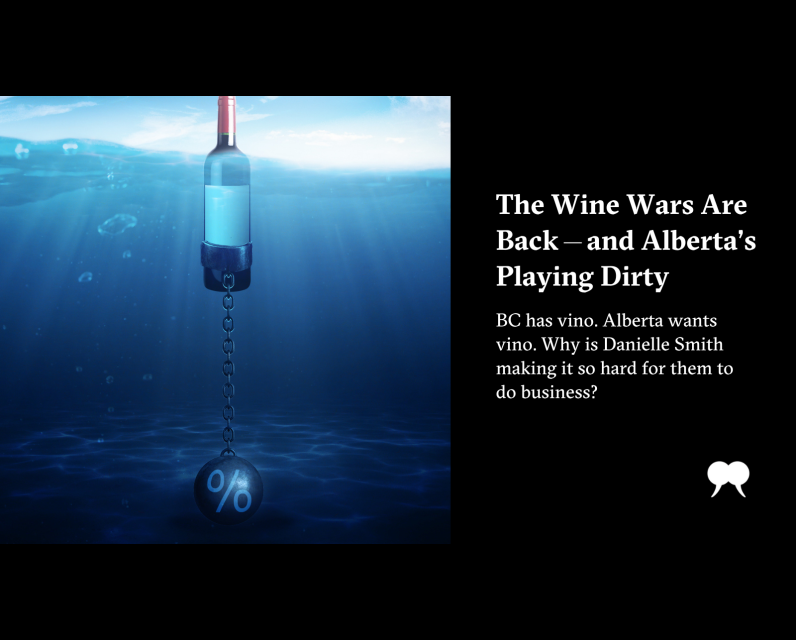The Wine Wars Are Back – and Alberta’s Playing Dirty

Christine Coletta and her husband, Steve Lornie, own two wineries in Summerland, BC: Haywire, a ten-acre property that looks out over Lake Okanagan, and Garnet Valley Ranch, a vineyard that sits at a higher elevation and put out its first wines in 2022.
Last winter, the pair decided to splurge on a public relations campaign directed at Albertans. The theme: “Come visit. Be our guest.” They hoped to attract Albertans to their wineries and turn those visits into direct-to-consumer sales after visitors returned home.
The stars seemed to be aligning for the domestic wine industry, and Coletta and her team wanted to make the most of it. Canadians were prioritizing buying Canadian in response to Donald Trump’s tariffs and his fifty-first-state threats. American wines had been pulled off shelves in several provinces. And premiers David Eby and Danielle Smith had signed an agreement the previous summer to allow BC winemakers to ship their products directly to Albertans.
Before that, the two provinces had been squabbling over wine sales for years. In 2018, the Alberta government, then under premier Rachel Notley, boycotted BC wines in a spat over the Trans Mountain Pipeline. The boycott lasted two weeks, but Notley’s government pledged to step up enforcement on direct-to-consumer sales. BC winemakers kept selling their products directly to Albertans, bypassing the taxes set out by Alberta Gaming, Liquor and Cannabis, or AGLC, the province’s regulator.
In January 2024, AGLC responded by threatening to ban BC wines from Alberta stores and retailers. But the two premiers found a compromise: BC wineries could sell directly to Albertans, and Alberta could count on collecting its share of taxes. The deal, which came into effect this past January, was hailed as a model for the rest of the country and a boon for an industry that has long struggled to grow under tight interprovincial restrictions. For Coletta, it felt like “a pivotal moment where we could really have made some inroads.”
In late February, shortly before Coletta’s social media campaign was about to go public, Smith’s government announced a new tax on all “high-value” wine. The ad valorem tax (Latin for “according to value”) started on wines priced higher than $15 a litre—or $11.25 for a 750 millilitre bottle, the typical size of a bottle of wine. The tax rose in three tiers: 5 percent on wines priced between $15 and $20 a litre, 10 percent on those $20 to $25 a litre, and 15 percent on everything above that. This in addition to Alberta’s per-bottle fee of $4.11 for a litre of wine.
That’s a lot of numbers. But what they mean is that someone in Alberta who buys a $20 bottle of BC wine will have to pay $26.11. On a case of those wines being shipped from BC, that’s an extra $73.32.
This hits BC winemakers hard. Almost every wine made in the province falls into the “high-value” category as defined by the Alberta government. As one Calgary wine shop put it, in cheese terms, that’s like defining high-value as “anything that exceeds the price of Cheez Whiz.”
Coletta and the rest of the province’s winemakers are furious. This is “another layer of government with their hands in our pockets,” Coletta says. And, she adds, the fees are nearly impossible for winemakers to implement given the logistics of calculating a three-tiered tax, in addition to a per-bottle tax, at the point of purchase. “It just wasn’t feasible,” she says. She soon scrapped the social media campaign and her wineries’ participation in the direct-to-consumer sales program.
At Lightning Rock Winery, a family-owned winery that’s ranked among Canada’s top twenty-five, sales to Albertans have dropped about 50 percent since the new tax took effect, says owner Ron Kubek. Potential buyers begin ordering wine online and walk away when the taxes are added to their bill. “I’m seeing a lot more abandoned carts, unfortunately.”
It’s now more expensive for Albertans to buy wine from him than it is for Americans to get wine through his winery’s agent in the US, Kubek says. He believes the ad valorem tax was brought in to increase revenues because of Trump’s new tariffs. “It’s despicable that the Alberta premier would use another country’s tariffs on the rest of the world [to put] new tariffs on Canadian companies,” he says.
It’s expensive to make wine here compared with the countries considered titans of the wine world. Land and labour cost more in Canada than in Chile or Argentina, and places like France and Italy heavily subsidize their vintners. Kubek says he can’t produce a bottle of wine for less than $15.
“Foreign countries can produce wine at $2 to $3 a bottle. Even in the US, they can produce wine at $2 to $5 a bottle,” he says. “We can’t even come close to that in Canada.”
The growth of Canada’s wine industry has always been hampered by competition from lower-cost imported wines and restrictions on the sale of Canadian products outside their provinces of origin, says Dan Paszkowski, president and chief executive officer of Wine Growers Canada. “Most countries around the world allow their wineries to ship wine to different parts of their own country,” he says. But not here. Each province and territory sets its own rules for alcohol coming across its borders. That rankles Canadians who want BC wine mailed to their homes or a good deal on cheap beer from Quebec.
Canadian wineries would get a boost if national direct-to-consumer sales were legally permitted across the country without heavy taxation, says Paszkowski. He estimates that direct delivery accounts for as much as 95 percent of sales for a small winery that lacks the production numbers to get its wines into large retailers.
For years, many Canadians secretly brought in alcohol from other provinces. But in 2012, the government of New Brunswick took a stand against citizens breaking the rules. Gerard Comeau, a retired power utility lineman who lived in the province, was caught in a Royal Canadian Mounted Police sting as he was bringing 354 beers and three bottles of liquor home from Quebec—far more than the twelve pints of beer or one bottle of liquor permitted by New Brunswick’s Liquor Control Act.
Comeau was fined nearly $300. He went to court in protest, saying the restriction on carrying alcohol across provincial borders violated the Canadian Constitution. New Brunswick fought back, all the way to the Supreme Court, in a case known as “Free the Beer.” And New Brunswick won. In 2018, the Supreme Court ruled against Comeau in a finding that was a big blow to domestic winemakers.
Provincial regulations on alcohol looked set to change this year as leaders in federal, provincial, and territorial governments called for removing internal barriers to trade. Almost no one was louder than Alberta’s Smith, who, in March, encouraged Albertans to “drink BC wine” in response to tariffs. That was after her government’s new tax was announced.
In 2005, the US Supreme Court struck down most state laws prohibiting direct-to-consumer sales of alcohol to out-of-state consumers. That’s led to increased revenue and investment and improved the quality of wine. Historically, Canada was the number one export market for American wineries, with retail sales over $1.1 billion annually.
“We don’t even have half the market share here for Canadian wines, [though] we have the capacity for it,” says Jeff Guignard, CEO of Wine Growers British Columbia. That might change, he adds, if governments allow free movement of Canadian wine across the country.
For now, some BC wineries are still shipping their products to Alberta without adding full tax. The “Free the Beer” sentiment lives on, but this time with wine. Albert Hudec, a senior legal counsel at Farris LLP, says this grey market will continue. It’s not even clear that Alberta has jurisdiction to go after BC winemakers. “There’s no inspection at the BC–Alberta border, so it’s extremely difficult to control,” he says.
The government of Alberta isn’t saying whether it will take action against BC winemakers or what that would look like. Alberta’s liquor regulation falls under the mandate of the Ministry of Service Alberta and Red Tape Reduction, which has a stated aim of “reducing regulatory burdens across government.” Minister Dale Nally did not respond to requests for comment.
Coletta is looking past Alberta to expand her Canadian customer base. She’s bringing a social media campaign to Manitobans instead, encouraging them to join Haywire’s winery. As she sees it, Manitoba is all in on an elbows-up approach to interprovincial trade. It does not put limits or additional taxes on domestic winemakers who want to ship their products to Manitobans. Coletta says that’s how it should be. “We’re just trying to get over all these provincial feuds that we have and lines in the sand that we’ve drawn, and wine seems to be an easy target any time Alberta gets upset.”
The post The Wine Wars Are Back – and Alberta’s Playing Dirty first appeared on The Walrus.


Comments
Be the first to comment